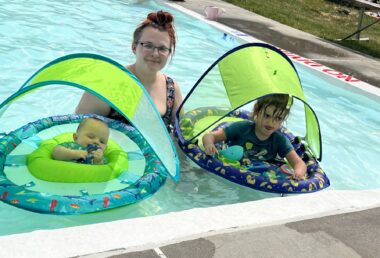How the pool benefits my son, who has limited mobility due to Pompe
A columnist looks forward to spending summer at the pool with her family

Last week, we had our first pool day of the summer. I got pool passes for myself and my 5-year-old son, Cayden, who really enjoyed it last year. In fact, he’s been consistently asking to go again. But here in Pennsylvania, summer is the only time it’s warm enough to take a dip.
While swimming is fun, I think Cayden also enjoys it because it’s easier for him to move around in the water than on land. Cayden has infantile-onset Pompe disease, which has resulted in weakened muscles and limited mobility. He can’t stand, walk, or crawl and depends on adults to transfer him from place to place. He also has a wheelchair but can’t operate it himself.
Despite years of physical therapy and using adaptive equipment like his stander, Cayden still can’t move independently. But in the water, he can a little bit. He uses a pool float since he can’t swim on his own, but he enjoys it because he doesn’t have to be held or confined to the stairs or the edge of the pool. Moving around in the water on his own makes him feel like a big boy!

Cayden, right, his little brother, Kyree, and Keara enjoy some time in the pool. (Courtesy of Keara Engle)
I feel confident enough to let him do his own thing in the pool, but only with very close supervision. It’s the only body of water I feel safe enough letting him explore with his float. Rivers and oceans aren’t safe enough for him to enter, even if he’s being held or just sitting in the shallow parts, and he’s not allowed to enter lakes because of the gastrostomy tube in his stomach. Standing bodies of water pose a higher risk of bacterial infections.
At our local facility, there are four different-sized pools. There are two deeper ones that he doesn’t use, a baby pool that’s only 2 feet deep, and another one that’s about 4 feet deep. He likes swimming in the shallower pools, but he can’t reach the bottom of the deeper one. Although he’s over 3 feet tall, he has to sit in his float, which means he can only reach the bottom in the baby pool.
I think we’ll visit the pool frequently this summer, especially since we have passes. It brings a smile to my face to watch my son moving around on his own, because that’s not something we really see outside of the water.
Note: Pompe Disease News is strictly a news and information website about the disease. It does not provide medical advice, diagnosis, or treatment. This content is not intended to be a substitute for professional medical advice, diagnosis, or treatment. Always seek the advice of your physician or other qualified health provider with any questions you may have regarding a medical condition. Never disregard professional medical advice or delay in seeking it because of something you have read on this website. The opinions expressed in this column are not those of Pompe Disease News or its parent company, BioNews, and are intended to spark discussion about issues pertaining to Pompe disease.







Comments